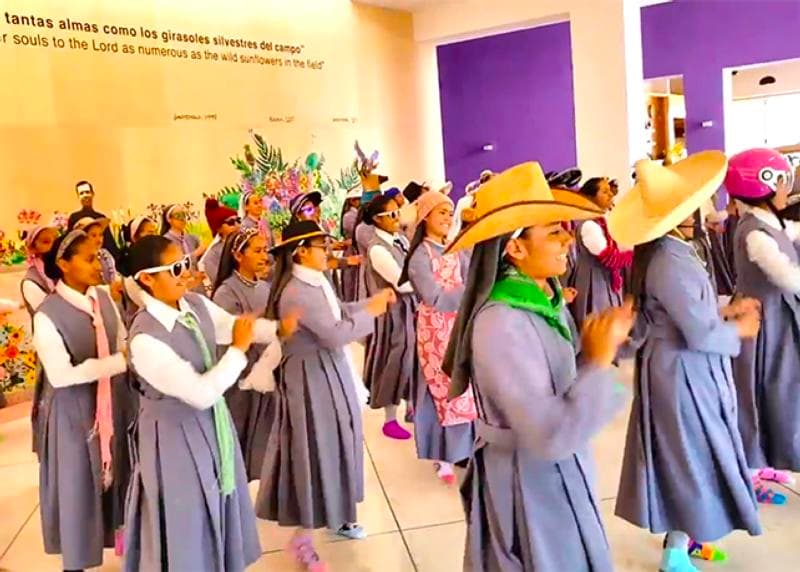WASHINGTON, D.C. — The pandemic and the ensuing economic downturn and the ongoing protests over racism sparked by the shocking death of George Floyd at the hands of police have created “the perfect storm,” making it a challenging time to raise awareness — and funds — to help the world’s poor, said Eustace W. Mita.
“More than ever we need people of means to help people who have no means” to educate, feed, house and heal people around the globe, said the Philadelphia Catholic, who earlier this year became the first layperson to be named president of the board of trustees of the U.S.-based Papal Foundation.
“People with no means are ‘the poorest of the poor,’ as Mother Teresa and John Paul II called them. We are lifting people up throughout the world, in particular the needs identified by Pope Francis. That work will always be paramount, even in tough times,” he said in an interview with Catholic News Service.
Mita, who with wife Suzie has five children and 14 grandchildren, is an entrepreneur and a hotel developer. The hospitality industry “has been the bull’s eye” in the pandemic shutdown, he noted. “We were the first ones closed.”
With the pandemic and the protests, it’s “hard to get anyone’s attention” when it comes to fundraising, Mita said, so the foundation is relying more than ever on its Stewards of St. Peter, as its members are known — and they “have stepped up tremendously.”
“So while we have slowed down our efforts in outside funding, we have increased our efforts in inside funding, in that we are making a plea to our own constituency to go over and above” their original commitment, he explained.
The grant funding process begins with requests made to the Vatican’s Secretariat of State through apostolic nuncios and local bishops worldwide. Once these are processed and reviewed, the pope requests funding for grants from the foundation, Mita explained.
Requests are received each fall and reviewed by the foundation’s Grants Review Committee, chaired by Tammy Tenaglia. Final approval by the board, with Mita as president and Boston Cardinal Sean P. O’Malley as board chairman, is given within three months.
The Papal Foundation funds are managed by the board of trustees, comprised of six American cardinals who reside in the United States and serve as ex-officio members, two lay trustees who also serve as ex-officio members, three archbishops and two bishops, and 21 elected laypeople from across the country.
In February, the foundation announced that its most recent round of grants and scholarships totaled over $12.6 million — supporting over 100 programs and projects on five continents, and 95 students from 35 countries.
A list of recent grants can be found on the foundation’s website, www.thepapalfoundation.org, under the tab “Our Grants.” Each grantee must provide regular reports and updates on how funds are used.
A couple of worthy recipients that stand out in Mita’s mind are a Catholic run-orphanage in Kisumu, Kenya, that picks up and cares for orphaned children left at the side of the road, and Girlstown and Boystown in Mexico, founded by the Sisters of Mary of the Poor for orphans abandoned by one or both parents and children who come from very poor families.
Other recent grants have been used to help people suffering from trauma and food insecurity; build churches and retreat centers for youth development; save the lives of newborns in need of urgent medical care; minister to individuals with disabilities; and promote human rights around the globe.
The need the foundation sees is “not static,” Mita said. “It can change depending on the weather, natural disasters, the geopolitical atmosphere.”
Sometimes the foundation has to rush funding, for example to help Syria’s persecuted Christians “fleeing for their own safety and welfare and life,” he said.
This is not just “checkbook charity,” Mita explained. “Our stewards are hands-on,” visiting projects that receive funding, and those visits are “some of the greatest eye-openers” as to what the need is out there, he remarked.
Another component of the foundation is the St. John Paul II Scholarship Program, which was the vision of St. John Paul in 1998 to ensure seminarians, priests, religious sisters and brothers, and laity from developing countries have the opportunity to study at pontifical universities in Rome. Applicants just need the support of their local bishop or the superior of their religious congregation.
With this year’s 95 student recipients, the foundation to date has provided over $11 million in scholarships to more than 1,400 individuals, known as Saeman scholars, named for John and Carol Saeman of Denver. The couple, two of the foundation’s Stewards of St. Peter, contributed the first gift to establish the fund, with the foundation providing matching funds.
In the past several months, “some terrible things have happened but that can’t preclude us from partnering with the Holy Father and focusing on the incredible things the church has done for 2,000 years in fulfilling the needs of the poor and marginalized worldwide,” Mita told CNS. “It is even more important to step up in times of crisis to engage the faithful and help those in need.”
“Right now … we’re living in a broken and wounded world,” and there is a lot of fear, he said.
But that fear “doesn’t come from our Savior, our God — fears comes from the enemy,” he said, “By staying close to the Word and to our Lord and our Lady through the rosary, prayer and meditation, the fear disperses and is replaced by faith.”
“As Catholics and Christians … God calls us ‘to love one another as I have loved you.’ If we get up every morning and love one another regardless of race, color or creed,” Mita added, “we can get through anything.”













